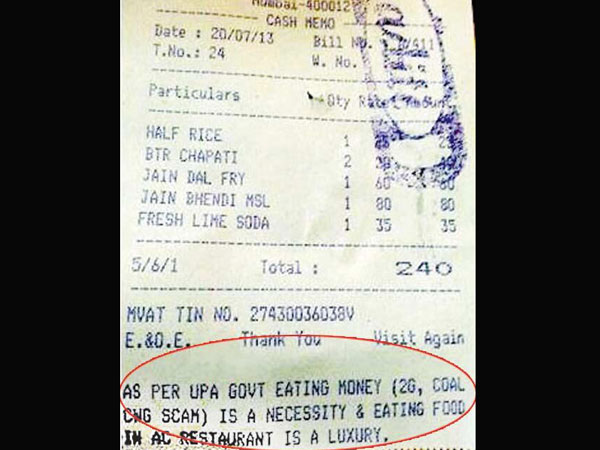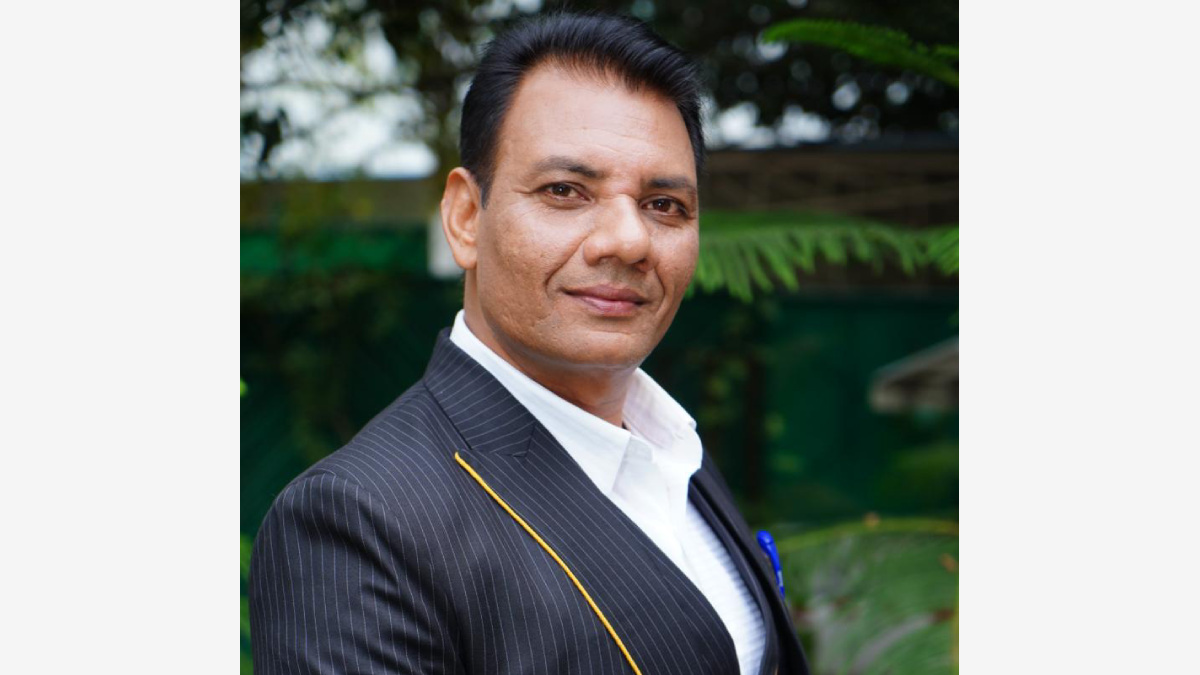'Anti-UPA' food bill & aftermath: 5 questions to our parties
Not even a day had passed since Congress Vice-President Rahul Gandhi asked the party spokesperson to abide by the party ideology, angry Congress youth leaders forced a restaurant in Mumbai to shut down for its owner had started printing 'defamatory' material against the UPA on bills. Gandhi had even said a few days ago that the workers are the leaders in the party and there is no reason to overlook them.
That the workers are the leaders was proved soon after around 30-35 workers of the Youth Congress approached the 'dissenting' owner of the restaurant, Aditi Pure Veg, around 3 pm and swamped the eatery. The protesters, who were led by the youth wing president of Mumbai, and an MLA, and also approached the police against the owner. They said they had received the orders from the party headquarters.

A non-cognisable complaint (Under Section 501 of the IPC) was registered against the owner, Srinivas Shetty. He reportedly promised that he would not circulate such bills again.
What was the defamatory material? The food bill receipts at the eatery located in Parel had the following words printed on them: "As per UPA government, eating money (2G, Coal, CWG scam) is a necessity and eating food in an AC restaurant is a luxury".
The incident has raised a storm. People are even thinking of printing the bill on their T-shirts as a mark of counter-protest. Strong words were expressed in social media as well. One was found asking if the Congress supporters could shut a hotel by force, why can't they go and shut a Chinese bunker at the borders?
The public grievances are understandable. This is something which is not unique with the Congress but a common disease which has plagued all political parties, whether national or regional, and we need to ask some pertinent questions about such unwanted incidents taking place across the country.
First, why do the parties ignore the fact that they have become increasingly alienated from the common people? The Mumbai hotel restaurant, who has been left alone to fight his own battle, said he had the right to express his views particularly because the government's policy of including all air-conditioned eateries in its purview of paying service taxes was costing him dearly.
Apparently, it seems that Shetty invited trouble for himself, but the reality is that he acted how a citizen of a democratic country should. We are not living in a dictator's country and vote regularly to elect our rulers. Then why should the parties treat those who brought them to power in such way?
Secondly, most of the Indian parties have strong, centralised leadership. They don't encourage democracy in the party's inner functioning and prefer to maintain the grip. Yet, they fail to discipline the evil elements in their own party. The Congress isn't the only party to blame for this. The Shiv Sena, the Trinamool Congress, the Left parties, you name them and their supporters are always on their toes to flex muscles and harass ordinary people. Why can't the supreme leaders rein in such unruly supporters and kick them out?
Thirdly, none of the Congress leaders have condemned the attack so far. However, one should not feel surprised since the top leaders of the party themselves are busy setting records on verbal abuse. The top leaders of the party, for a change, should take a look at themselves instead of constantly targetting opponents. If hooligans are not dealt with by the parties strictly, the average citizen will continue to be an anxious lot. Who is going to take care for them?
Fourthly, why couldn't the Congress workers ignore the bill and take the wit in their stride? This raises a bigger concern: Why are we intolerant even after practising democratic politics for over 60 years? We have seen how Shiv Sena workers vandalised a hospital after a girl made an innocuous remark on Facebook or Mamata Banerjee targetting individuals as 'Maoists' for asking uncomfortable questions. If dissent can not be tolerated, then what form of democracy do we live in? What's the point
Finally, the Mumbai incident showed yet again how parties and individuals are increasingly confronting each other in the socio-political space in India. Thanks to a widespread media (electronic or social), a common man today has more effective avenues to make himself relevant even after the votes get over and seek explanation from his political representatives over their performance. This is the most positive aspect in such confrontations.
A few days ago, we saw two housewives taking on the chief minister of a state demanding justice for a college student who was gangraped and brutally murdered in West Bengal. Before that, we saw an elite college student and a farmer drawing ire of the same chief minister for asking questions to her disliking.
These are positive developments. The politicians, who love to take their electorate for granted once they are voted to power, have started feeling the heat because the common man is no more ready to bear the brunt. This emboldening of the common man has rattled the political class and it has been found committing blunders while dealing with the dissent.
The Congressmen who targetted Srinivas Shetty in Mumbai asked why didn't he go through legal channels to address his grievances instead of defaming their party, my counter-question to them is: "Why don't they go through democratic channels while addressing their electors and target them physically?"


 Click it and Unblock the Notifications
Click it and Unblock the Notifications



































